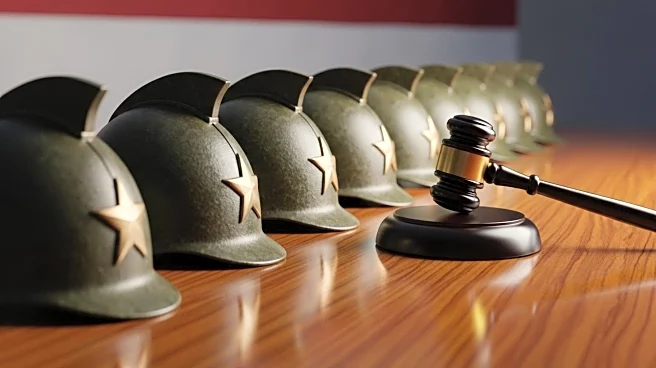What is the story about?
What's Happening?
A federal appeals court has ruled that National Guard troops in Illinois can remain under federal control but cannot be deployed, as the legal battle between the Trump administration and the state continues. The Seventh Circuit Court of Appeals temporarily paused a lower court's order that halted deployments of National Guard troops in Illinois for two weeks. This decision is part of a broader legal dispute over President Trump's authority to deploy troops to manage demonstrations near ICE facilities in cities like Chicago and Portland. The court's ruling allows the troops to engage in planning and training but not operational activities. Illinois Attorney General Kwame Raoul hailed the decision as a victory for state and local law enforcement, emphasizing their role in protecting community rights. The Trump administration has appealed a previous decision blocking the deployment, arguing that federal intervention is necessary to address ongoing riots and lawlessness.
Why It's Important?
The ruling has significant implications for federal-state relations and the balance of power in managing civil unrest. It underscores the tension between the Trump administration's approach to law enforcement and the autonomy of state governments. The decision affects how federal resources can be used in states experiencing protests, impacting local governance and community relations. The legal battle also highlights differing perspectives on the severity of protests and the appropriate level of federal intervention. States supporting Illinois argue that the federalization of the National Guard is unconstitutional and undermines democratic principles. The outcome of this case could set a precedent for future federal involvement in state affairs, influencing policy decisions and civil rights protections.
What's Next?
The legal proceedings are expected to continue, with the Trump administration seeking to overturn the restraining order on troop deployment. The Ninth Circuit Court of Appeals is also considering a similar case involving the Oregon National Guard, with a decision anticipated soon. The ongoing appeals may lead to further judicial scrutiny of the administration's actions, potentially reaching higher courts. Stakeholders, including state governments and civil rights groups, are likely to continue advocating for their positions, influencing public discourse and policy. The situation remains fluid, with potential implications for federal-state dynamics and the administration's law enforcement strategies.
Beyond the Headlines
The case raises broader questions about the use of military forces in domestic situations and the legal boundaries of presidential authority. It touches on ethical considerations regarding the militarization of law enforcement and the impact on civil liberties. The dispute may also reflect deeper cultural and political divides in the U.S., with varying interpretations of public safety and government intervention. Long-term, the case could influence legislative efforts to clarify the role of the National Guard and federal agencies in domestic affairs, shaping future governance and civil rights frameworks.
















